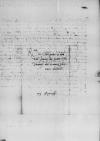List #1900
Tiedemann GIESE do Ioannes DANTISCUSLöbau (Lubawa), 1538-08-09
| odebrano [1538]-08-11 Rękopiśmienne podstawy źródłowe:
| ||||
Tekst + aparat krytyczny + komentarz Zwykły tekst Tekst + komentarz Tekst + aparat krytyczny
Reverendissimo in Christo Patri et Domino, domino
Reverendissime in Christo Pater et Domine, domine et maior plurimum observande.
Salutem et studiorum meorum commendationem.
Accepi a Reverendissima Dominatione Vestra rochetam, iusta, ut mihi videtur, longitudine, sed non pari dignitate ornaturam me ac priorem dominum, gratissimum tamen est donum, quo non minus mihi videbor insignis, quam
cf. Vitr. 2.1 Dinocrates architectus cogitationibus et sollertia fretus, cum Alexander rerum potiretur, profectus est e Macedonia ad exercitum regiae cupidus commendationis. Is e patria a propinquis et amicis tulit ad primos ordines et purpuratos litteras, aditus haberet faciliores, ab eisque exceptus humane petit, uti quamprimum ad Alexandrum perduceretur. Cum polliciti essent, tardiores fuerunt idoneum tempus expectantes. Itaque Dinocrates ab his se existimans ludi ab se petit praesidium. Fuerat enim amplissima statura, facie grata, forma dignitateque summa. His igitur naturae muneribus confisus vestimenta posuit in hospitio et oleo corpus perunxit caputque coronavit populea fronde, laevum umerum pelle leonina texit, dextraque clavam tenens incessit contra tribunal regis ius dicentis. ⌊
Dominus
Commendo me favori et benevolentiae Reverendissimae Dominationis Vestrae, quam Deus servet diutissime felicem.
Ex
Eiusdem Reverendissimae Dominationis Vestrae obsequentissimus
Postscript:
Consecrationis meae diem et locum nolo ex meo, sed ex Reverendissimae Dominationis Vestrae arbitrio pendere, quod ex ipsa exspecto.


 BCK, 1597, p. 64
BCK, 1597, p. 64